Apple is facing another class-action lawsuit related to iTune but over the purchased content, this time. The new case filed in the District Court for the Western District of New York claims that the company is misleading consumers by letting them believe that they are purchasing or renting content on iTunes but in reality, they are only licensing content.
Earlier this year, a class-action lawsuit was filed in California over the restrictions to re-download content purchased on iTunes. Furthermore, the plaintiff accused Apple of terminating users’ access to their purchased content.

Apple pulls licensed content via iTunes without warning when the agreement terminates
As per the report by Apple Patently, the new case accuses Apple of deceptive practices by using the terms Buy or Rent shows, movies, music, and more via iTunes and saves them in the ‘Purchased Folder’. But, the purchased content is only licensed and is removed from the “Purchased Folder” when the agreement is null and void.
Except for content Defendant owns outright, the Digital Content purported to be sold on iTunes is licensed to Apple by the Digital Content’s owner. These licensing arrangements mean that, unlike in a true sale, Defendant can never pass title to the purchasing consumer. Accordingly, when a licensing agreement terminates for whatever reason, Defendant is required to pull the Digital Content from the consumers’ Purchased Folder and it does so without prior warning to the consumer.
Furthermore, the filing states that Apple charges the same fee for licensed content as other stores “that actually passes title of Digital Content to consumers, which access can never be revoked.” In conclusion, Apple is accused of using misleading terminology on iTunes to charge consumers a high fee for licensed content.
Thus, Defendant is misleading consumers into believing it is selling them Digital Content, even though it is only providing them with a license. Defendant likely misrepresents its “sale” transactions for one reason: if it called the transaction what it really is, some type of sublicensing arrangement, it could not charge nearly as much as it charges for the Digital Content by misrepresenting to consumers that is a sale.
Recently, a class-action lawsuit related to the cracked screens of M1 MacBook models during normal usage was filed in the District Court of California. Apple is accused of shipping defective products and not providing free replacement or repairs.

